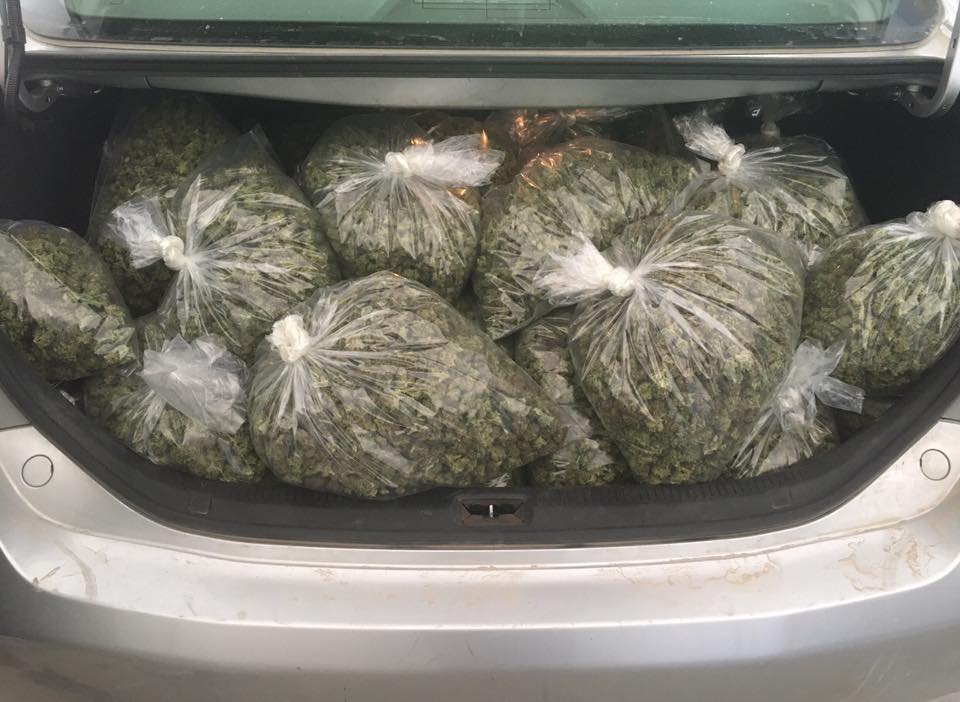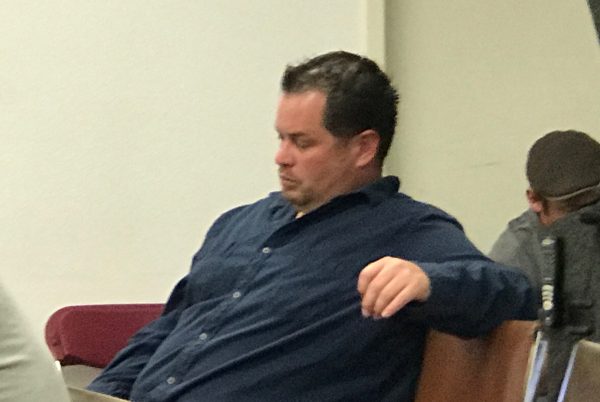Money laundering claims linked to illegal out-of-state marijuana sales
October 12, 2018

A trunk loaded with pot on one of Helios Daypring’s company’s Facebook pages.
Editors Note: Since the legalization of marijuana, allegations of bribery, human trafficking, black market sales and money laundering have surfaced. The issues involved are complex and the profits are huge. Several public officials are accused of accepting bribes and entering into close relationships with several marijuana business owners. A series of stories over the next week will examine the allegations and provide information that explains what has happened in the Central Coast.
By KAREN VELIE
Former employees and associates have accused Helios “Bobby” Dayspring, a local marijuana entrepreneur, of illegally trafficking marijuana and money laundering. They allege that Dayspring ships marijuana from his grows out of state and uses real estate purchases to launder profits. [Cal Coast Times]
Dayspring is involved in more than a dozen marijuana grows, a Grover Beach pot shop and other marijuana enterprises that are part of the multi-billion dollar legal marijuana industry for California growers.
But legalization also sent prices plummeting as consumers no longer had to pay prices that drug dealers charged. In California, a pound now sells wholesale for about $1,200 to $1,300, while out-of-state traffickers command approximately $2,000 a pound. At the same time, regulatory requirements in California can add $450 a pound in cost to marijuana farmers.
California grew more than 13.5 million pounds of marijuana last year. But only 2.5 million pounds were consumed statewide. The vast majority was trafficked to states where marijuana is still illegal, according to California’s Department of Food and Agriculture. Selling marijuana across state lines is illegal under federal and state laws.
Several of Dayspring’s former marijuana grow employees say that he routes marijuana to Los Angeles, and from there to the Midwest and the East Coast.
Dayspring sends hundreds of pounds with drivers in trucks or cars to LA a couple times a month, said Tony Brocking, a former employee of Dayspring.
One of Dayspring’s partners on several grows, Knut Siegfried, said the allegations are untrue and they do not traffic marijuana out of state.
Cannabis growers, even legal ones, have problems with their finances. Banks that handle money from marijuana sales can be charged with money laundering under federal law and won’t finance or accept accounts from growers.
The problem is even bigger for growers who illegally traffic in marijuana. Legal sales have a paper trail and growers can show where their money comes from. That does not happen when a grower is selling marijuana at the higher prices brought in from drug dealers.
Some illegal cannabis entrepreneurs funnel cash proceeds through retail or service businesses, while others money launder through real estate purchases and phony loans. A handful of his former grow employees said Dayspring launders his marijuana proceeds through several real estate schemes including paying cash under the table for properties, putting properties in other people’s names and receiving phony loans on the properties.
The former employees identified more than a dozen Central Coast properties linked to Dayspring.
County records show many of the properties that Dayspring has bought were purchased for well below market value.
One such property came on the market after Thomas Yanaga shot and killed Marshall Savoy in 2015. During Yanaga’s trial, he and his wife tried to sell a three-bedroom home they owned on 3.51 acres on San Gregorio Road in Atascadero.
Even though the county assessor valued the property at $704,176, county records show the property sold for $303,000 in 2015. Several of Dayspring’s former workers said he paid $650,000 in cash for the property.
And while Dayspring has claimed ownership of the property, it was purchased in the name of Luis Gonzalez, an associate of Dayspring. After CCN reporters began investigating the purchase, an attorney for Dayspring contacted CCN to pass information from Dayspring, that he only paid the $303,000 that county records list as the sales price.

Helios Dayspring at a Grover Beach Council meeting.
In Feb. 2017, seven men broke into Dayspring’s San Gregorio home and held him at gunpoint while they tied him up. The robbers then snatched 885 pounds of medical marijuana and $139,000 in cash, according to court records.
In Jan. 2014, Dayspring purchased 90 percent interest in a two bedroom home on 40 acres at 7840 Cougar Ridge Way in South San Luis Obispo County for $378,000. A year later, the remaining 10 percent was deeded to Dayspring, though no price was included on the deed, according to court records.
In 2005, the 7840 Cougar Ridge Way property had sold for $890,000.
On the Central Coast, agricultural land generally sells for approximately $20,000 an acre, said Debbie Peterson, a local real estate broker.
In Northern Santa Barbara County, where several of Dayspring’s grows are located, a 50 acre parcel was recently listed for sale at $200,000, or $4,000 an acre. But Dayspring has been able to purchase land for as little as $844 an acre.
On Sept. 14, 2016, Dayspring purchased 120 acres in northern Santa Barbara County for $100,000, or $844 per acre.
A month later, on Oct, 31, 2016, Dayspring and one of his frequent partners in the cannabis industry purchased a 40-acre property in Northern Santa Barbara County for $40,000, or $1,000 an acre.
When asked about the money laundering allegations, Siegfried said that they do not launder proceeds, they are just able to buy property cheap.
“Helios never does anything illegal,” Siegfried said. “The properties were just super cheap.”
Dayspring returned a request for comment, but hung up on a reporter before answering any questions.






The comments below represent the opinion of the writer and do not represent the views or policies of CalCoastNews.com. Please address the Policies, events and arguments, not the person. Constructive debate is good; mockery, taunting, and name calling is not. Comment Guidelines